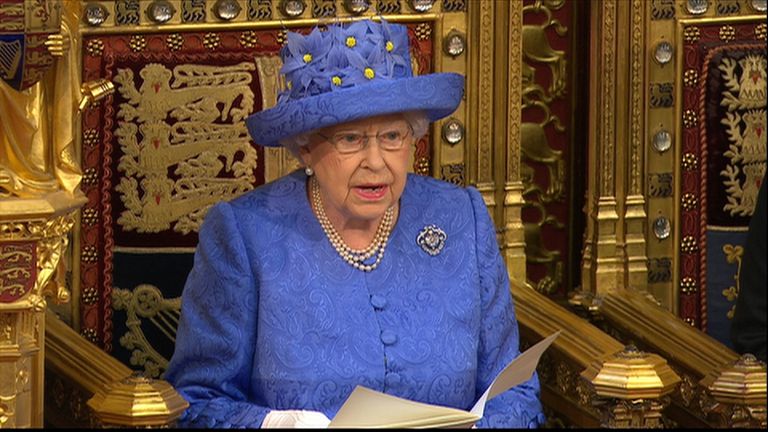The Queen's Speech: What's in it for business?
The most business could realistically hope for from the important speech was a minimum of tinkering and Government interference.
Wednesday 21 June 2017 18:25, UK
There wasn't much in this Queen's Speech about which business could get terribly excited.
This is hardly surprising.
Theresa May's minority government has had to ditch many of its manifesto commitments and, in a two-year parliamentary session, its priority is going to be negotiating favourable terms for Brexit and smoothing the transition to life outside the EU.
The most business could realistically hope for was a minimum of tinkering and Government interference and, with any luck, a few measures aimed at raising the long-term productivity of the UK labour force.
To that end, energy companies will welcome the fact that there was no specific commitment in the Queen's Speech to the manifesto pledge for a cap on standard variable domestic tariffs - a measure that, where it has been tried elsewhere in the world, has killed competition.
Ofgem, the energy regulator, can in theory introduce such a cap, although what seems more likely is some kind of measure aimed more vaguely at protecting people on the worst value tariffs. The industry will be rather more pleased, though, by news of a Smart Meter Bill aimed at widening energy efficiency.
Other things notable by their absence, and whose absence will be welcomed by business, included Mrs May's commitment to cut immigration to the "tens of thousands". Few policies have been more derided by business.
There will also have been sighs of relief that there appears to be no plan, now, to try to meddle with the composition of company boards, to clamp down on executive pay or give workers a say on the running of businesses. These commitments, again, threatened to drive a wedge between ministers and the wealth creators in the economy.
The show-stopping bill in this Parliament, naturally enough, is going to be the Great Repeal Bill to transpose EU law into UK law.
However, as the manufacturers organisation the EEF pointed out, there was little in this speech addressing how the Government will remove uncertainty over tariff-free trade and minimising uncertainty over customs.
And, as the British Chambers of Commerce noted, a new Trade Bill will not necessarily assuage the fears of companies who would rather see protection of existing levels of market access prioritised above striking new free trade deals.
Among promised infrastructure investment, there were three bills, of which one, predictably, was the High Speed 2 Phase 2A Bill aimed at facilitating the building of the new high-speed rail link between Birmingham and Crewe.
HS2 still divides opinions in the business world, as it does everywhere, with many business leaders wanting it and others convinced the Government could get more bang for its buck by making smaller, incremental improvements to national infrastructure elsewhere.
::
The other two big infrastructure-related bills are the Automated and Electric Vehicles Bill, which will be welcomed by those businesses involved in developing technology for driverless and electric cars, and the Space Industry Bill, which should also go some way to solidifying the UK's already strong position in the global space sector, which is second only to the US.
Also likely to be welcomed by business is the Civil Liabilities Bill, aimed at attacking the compensation culture and false whiplash claims that have shredded the profitability of motor insurance providers. This is also a consumer-friendly measure if it can bring down motor insurance premiums.
What makes an economy succeed, though, are long-term measures that, for example, improve productivity by raising the skills base and boasting technical education and training. These are things in which both businesses and Government should be able to collaborate without an act of Parliament being handed down on tablets of stone.
Aside from facilitating a smooth Brexit and limiting the inevitable disruption it will cause, the other main thing business wants from the Government is fiscal responsibility. The deficit did not get mentioned much during the election campaign but, with the Government set to spend £1bn more than it raises in taxes every week this year, it is still big enough to cause concern to many.
Every extra pound borrowed adds to the national debt which, this year, will hit 90% of GDP. Where the debt goes much higher than that, it spells trouble for an economy, as was discovered by many countries during the Eurozone sovereign debt crisis.
As with the campaign, restoring stability to the public finances was not mentioned much in the Queen's Speech either, but it remains, alongside Brexit, the greatest challenge this Government faces.






